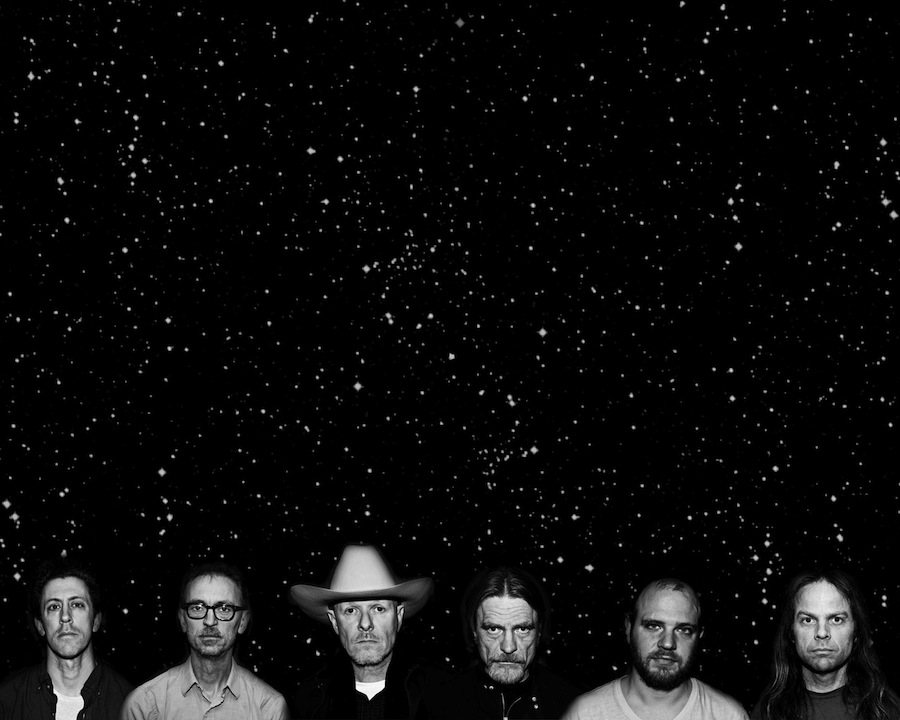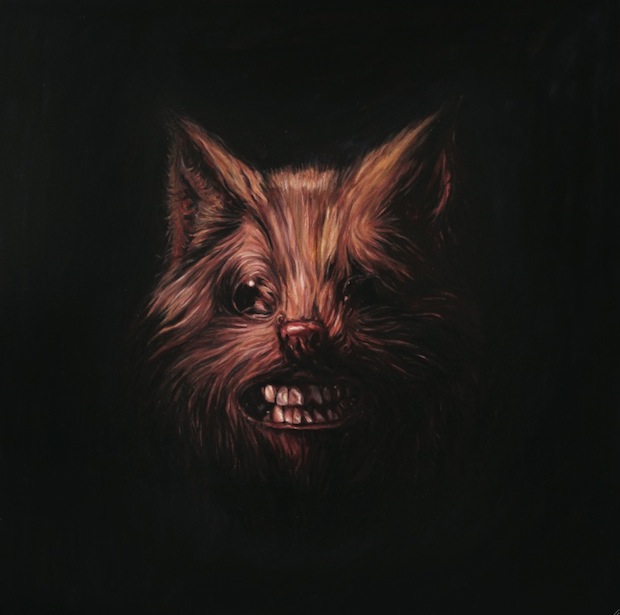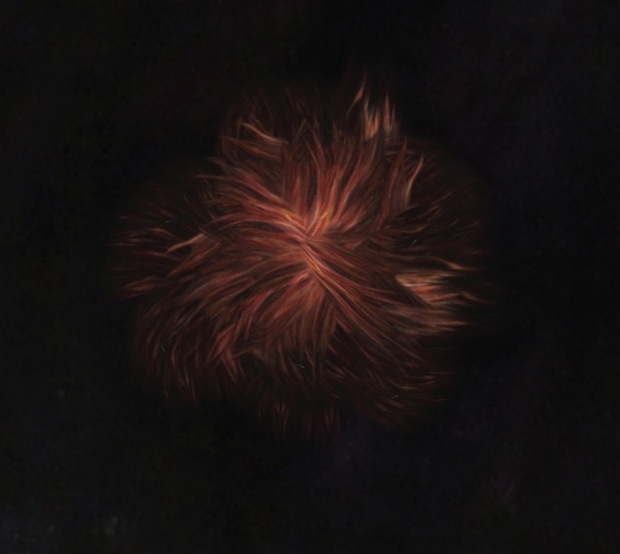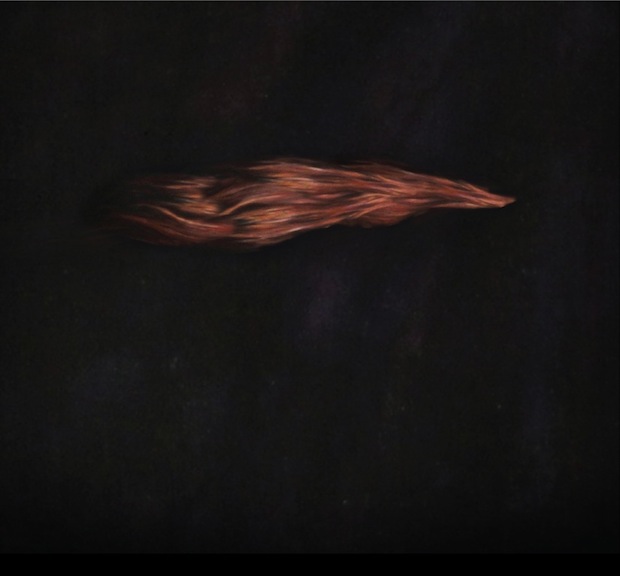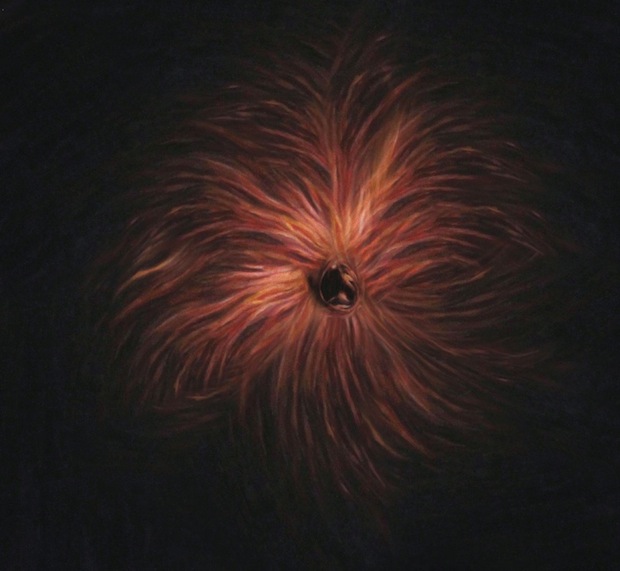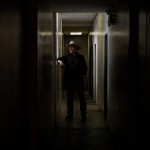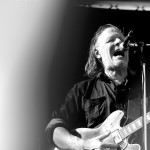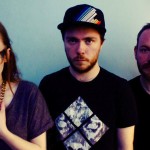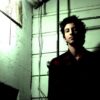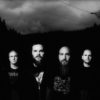Words by Andrew Parks
Michael Gira turns 60 in a couple years, which shouldn’t matter given that the average American male lives to be about 80, but then again, the average American male doesn’t play in a band like Swans. Since its reactivation in 2010, the post-punk pioneers have balanced a tireless tour schedule–sets that often feature 30-minute songs–with cross-continental sessions for Gira’s bravest album yet. Mind you, his career’s been full of ’em, from the nihilistic no-wave of Filth and Cop to the majestic sprawl of Soundtracks for the Blind. Due out tomorrow through the frontman’s Young God imprint, The Seer isn’t a woe-is-me meditation on mortality; it’s a full-fledged attack on mediocrity, balancing moments of pure, unadulterated beauty with battery ram barrages of noise and downward spiral drones. Several tracks are so dynamic and long they practically warrant their own EPs; instead, we’ve been blessed with nearly two hours of transcendental music.
“I didn’t give a fuck how long it was,” Gira says, after we ask him when he decided to spread The Seer over two discs. “I thought I’d take the material to its greatest extent and figure out how to deal with it later. Paradoxically, the best way to listen to it–maybe not sonically, but thematically–is digitally because you can listen to the whole thing all the way through. I guess it’s the revenge of the digital age.”
With that in mind, we interviewed Gira about every track in depth, all of which are available to stream exclusively alongside his commentary down below…
Where was most of this album recorded? In Berlin?
We had 10 days in Berlin. Three quarters of the way through the last tour cycle, we’d developed these songs and I had some basic things worked out on acoustic guitar. Eventually I added lyrics and they developed organically with the live lineup, who are stellar I might say. So we recorded those–the ones that had been written at that point–in Berlin, and at the end of the tour, we had some more things develop and we recorded those in a place near me in Upstate New York with Kevin McMahon. And then I had more songs written on acoustic guitar, so we developed those from the ground up, just myself and our drummer Phil [Puleo]. I spent about four or five months there, sleeping on the couch, doing overdubs and bringing things into the state they are now.
That’s always been your process right–starting with your acoustic guitar and building the songs from there?
Yeah. This was different because four of the songs were developed live first. That was the first time in my tenure as a musician where we developed songs before an audience. They grew into their recorded state by being performed every night for a year.
What four songs were that?
“The Seer,†“93 Ave. B Blues,†“Avatar†and “The Apostate†were all developed live.
So all of the intense ones then?
They’re all intense man. [Laughs] I like a lot of variations and dynamics in a record.
This really feels like one of your bravest records, one that’s a culmination of not just old Swans material, but Angels of Light and things like the Body Lovers. It’s a great overarching statement, one you could feel comfortable with leaving behind if you retired tomorrow.
I hope I’ll always be making music, but yeah–I just put every resource into this, intellectually, emotionally, financially. I decided to go for broke, and I actually did. I went broke. [Laughs] What matters is doing the best work I can. What else am I on earth for?
One thing I want to say is that interviews usually end up sounding really egotistical, because they’re always about me, lyrics and production, but this band is really the best lineup I’ve ever had in Swans in terms of us getting along and feeding off one another…When I restarted Swans, it was really my only option, my only way to keep doing music and keep being vital. I guess i didn’t have a second album in mind at first, but it became apparent that it was really fertile, so I decided to keep pushing it.
Let’s go through it all track by track now then, shall we? And please make a mention of anyone who helped out, although that’s going to be tough considering around 40 people contributed to this record.
Yeah, I’m not sure I even remember everyone at this point [laughs].
The last show of yours that I saw was at Brooklyn’s Masonic Temple. The long, pummeling buildup at the start of that show reminds me of the buildup of this song.
That was a song called “No Words/No Thoughts,†although I feel strange calling any of these tracks ‘songs’, because they’re not for the most part. That piece was really chunks of sound and rhythm, from beginning to end. “Lunacy,†on the other hand, is pretty much one long major chord, written on acoustic guitar. It’s a little different, but I thought it was an appropriate intro to the record.
I was blessed by having Al and Mimi of Low sing on it. I’m a slavish fan of theirs. Whenever I see them live, I can’t contain my enthusiasm. Usually they try and usher me out the door or something. [Laughs]
You’re the one guy shouting over their slow, quiet songs then?
Yeah. I just think they’re so soulful and real–everything music should be. There’s no style element. It’s just totally heartfelt, what I like to call prairie gospel music. It comes from a really deep place. I admire them so much, especially their ability to do so much with so little, something I’ve never been able to do successfully. If I could sing like them, I’d be really happy but I can’t. Instead, I sing like Burl Ives.
Is there any reason you chose them for that song in particular?
I don’t know why, actually. It just came to me–that they should sing on this. The song is loosely based on the inner dark places in a child. I certainly know a few things about children, having a couple of them myself. So I thought [Al and Mimi’s] soulfulness would grace it very well.
Do you mean how children don’t have an innate sense of what’s right and wrong?
Well, we have an id, don’t we? I have two very young children right now, so I see that; it’s a subject I’ve thought about a lot–when morality beacons our inner nature…I think [Al and Mimi] brought a little schism or dichotomy to the song, one that was pleasing. It was nice to sing with them. It’s not like background vocals; it’s us singing together. Kind of like Bing Crosby and David Bowie singing together.
Only more discomforting.
Is it discomforting? [Laughs]
So it basically feels like you’re being chased by someone, or something, for the first five minutes of this song.
[Laughs] Could you make out me panting in that song? I’m like a hi-hat or something..This is just a groove I had. I wanted it to go on endlessly, and I guarantee it will live. [Laughs] I recall it needed something. I guess I was drunk around 3 in the morning during a rehearsal, and then I added that ‘woo-hoo’ vocal…my atonal falsetto. And then I guess it goes into something a little more songwriting-oriented. There’s a lot of positioning in this record, a lot of things opposed to one another. That comes from listening to something like [The Beatles’] White Album. Things working against each other makes for more of a total experience. If everything’s just loud all the time, it doesn’t sound as good anymore. I started thinking of things as more situational starting with [the 1991 album] White Light From the Mouth of Infinity. These little transitions and segues started occurring, and by the time I got through the slog of that, Love of Life, The Great Annihilator and Soundtracks For the Blind, the transitions became the point. They’d become a whole new way of making music. It’s all about context. How these things are arranged is not an intellectual decision; it’s about satisfying my need to hear something.
Do a lot of these ideas start with you, then you take them somewhere completely different with the band?
It starts in my brain and on the acoustic guitar, then [the band] brings their character to it. The approach is guided by me, but they do things that surprise me, I’ll seize that, and it’ll end up transforming a track. It’s very collaborative in that way. Generally, I write the songs, although I gave them equal credit on these songs because we went back and forth so much. It’s like [John] Cassavetes–he’s a director, but people are always giving him input at the same time. These guys are committed to making something exceptional happen. It’s a give and take. It’s not like I’m a composer or something. That’d be preposterous for me to say. I just help bring the thing into a form.
So this is one of the shorter songs on the album:
Yeah, I don’t know what the fuck that is. It’s just me singing with an acoustic [laughs]. It’s not even meant to be a good vocal. It’s meant to sound like shit. But uh, it’s a little tribute to someone I can’t really talk about. It’s just one mic in a room, with me playing guitar in the background, and serendipitously the fan in the room came on at the same time, so that’s the other noise that comes in.
Is the title a reflection of the cover art at all?
That came later. It’s meant as a piece to precede “The Seer.â€
Is there any overarching concept to this album?
I did Children of God years ago. I’m not going to do that shit again.
Man, I don’t even know where to start with this one. It’s that complex.
Well, it developed organically live. The dynamics, nuances and everything developed that way–out of playing in front of an audience and trying to make something urgent happen. The first three or four minutes were done in the studio, as a song collage that could lead into the groove. But I don’t know what else to say about it. [Laughs] That groove was very difficult to achieve. It started out like this horrible Killing Joke groove. We’d change it every show, and eventually it took on this sensual yet physical aspect.
Do you remember when that happened, when you looked at the other guys and felt like, ‘We’ve got it finally’?
It kept slowly changing. In fact, it changed again recently, since we made the record. And it’s working really well. We’ll play it live on the upcoming tour.
A lot of the album sounds like it was cut live to tape. Is that even the case with a song that’s as long as this one?
All of it’s live, except for the first two or three minutes, but then it was butchered by me, and there were a lot of overdubs. I don’t usually look at one of my records as trying to capture a band live in a room. I look at that more as the beginning; the studio is a tool, an instrument in and of itself. I guess that comes from admiring people like Brian Eno and George Martin–producers who look as recordings for sonic fodder to make something else happen. Of course, you still have to have a good performance. Otherwise, it just sounds false, like some Pro Tools shit.
So one guy who helped out on this track is Bruce Lamont from the band Yakuza. How did you end up working with him?
He did an interview with me for the Chicago Reader or something. We hit it off, and I found out he played the saxophone, so I asked him to do something along the line of La Monte Young’s very early work–these Coltrane-like cycles that are based around one note. Then I got Ian Graham to do some wonderful bagpipe work, and Bob Rutman to add some steel cello. He works with [Swans guitarist] Christoph [Hahn] in Berlin. He’s like 72 or something, an avant grade musician who makes these ‘cellos’ out of steel. They have these beautiful tones. He’s actually going to open for us in Berlin–his piece is going to bleed into our set.
You guys are just going to walk on stage, one by one, while he’s playing?
I have no fucking idea. [Laughs] We’ll figure it out at sound check. But yeah, he plays these deep, pure drones that modulate, and they go into this song that’s really just a collection of muffled sexual innuendoes.
Drone music has always played a part in your songwriting, but it seems like a driving force on this particular album.
I guess so…Sometimes I feel like I’m cheating if I change a chord, like, ‘Why would you change that chord when it’s good as is?’ It’s better to find places within the chord than change it.
Yeah, some of these songs sound like they could go on forever.
And they will on the next tour. “The Seer†might end up being 50 minutes. I don’t know. Our set right now is two hours in rehearsals, but that always grows, as things morph, so I don’t know how long anything’s going to be. All I know is that I’ll probably die at the end of the tour. [Laughs]
Do you not stop until you feel emotionally spent from a song?
Yeah, I accept my failure and I let it go. I guess this isn’t a wise thing to say from a promotional point of view, but none of them satisfy me completely.
Given the title, how does this song relate to the previous one?
The end part of “The Seer†is a completely wrecked version of “The Seer Returns.†I took that guitar riff into the studio in Berlin, and we made it into something new. When we got back to Upstate New York here, we recorded a simple blues riff that’s inspired by Howlin’ Wolf of Muddy Waters, and I just started hacking at it. It ended up being more of a sound collage than a song, and the lyrics kinda worked with that.
The concept of lightness seems to run through a lot of this record.
That’s what a lot of us seek when we make rock music–this epiphany. Light, to me, is an epiphany, although I guess it has some sexual connotations in this song too [laughs].
Jarboe’s on this track, too. Are her contributions to this record from past sessions, or did you work with her recently?
It’s just notes I asked her to sing. Colleen Kinsella from Big Blood helped out too, with these long notes, and Grasshopper from Mercury Rev added some clarinet parts for the swirl of sound in that song. I’ve used him on a couple records now. I love people whose company I enjoy being at the studio, regardless of what instrument they end up playing. It just adds a vibe, I guess–that horrible rock term.
Oh, I should also mention Bill Rieflin. Do you know him?
He’s your ‘honorary Swan’ right?
Yeah, he has a storied past. I guess he was first known as the drummer from Ministry. Then he played with Robyn Hitchcock; he also plays with Robert Fripp. Bill plays every instrument, so I often bring him on three-quarters of the way through a record. I’ll bring him on and ask him what he thinks of every song, then he’ll play piano, some guitar, some synths:everything. He’s a tremendous resource.
I assume the title of this song is a reference to your Lower East Side days–the ghosts of Swans past, if you will?
Yeah, that’s where I lived from 1981 to 1992 or something. And that’s where we rehearsed all the time. Sonic Youth rehearsed there as well. It was a very intense locale. This song is an improvisational thing we started doing live as an encore and a prelude to the song “Little Mouth.†It developed organically from there. And the reason why I called the song “93 Ave. B Blues†is a lame reference to “L.A. Blues†by the Stooges.
Here’s another shorter song.
Yeah, that’s just an acoustic song. I’m not sure what to say about it. I think it’s a pretty little song.
You always seem so apologetic about your voice.
I’m fully aware that I am by no means Nick Drake.
Your voice has its own character though, kinda like how Tom Waits does.
Yeah, I guess so. [Laughs]
Is a song like this one something you didn’t have to labor over as much as one of the long ones?
I labor over everything because things don’t come easily to me. I’d love it if [ideas] just came out, but no, I work really hard on them. With this one, I wanted to create a very specific environment and mental space. I don’t want to kill it for other people by explaining the lyrics, but it’s a nice opposition to the barrage of sound that is “93 Ave. B Blues.â€
This song’s a bit sweet for you.
It is a sweet song. I guess I shouldn’t be talking about this in interviews because it’s a little syrupy, but that song’s a tribute to my young daughter. I wrote it on an acoustic guitar and when I started singing it, I didn’t think my voice was doing it justice. Our bass player Christopher [Pravdica] is friends with pretty much everyone in the Yeah Yeah Yeahs, so I asked Karen to sing it. Her soulful, compassionate voice sounded perfect for the subject matter…I thought it was a really fucking good song, but it needed the right voice. Being a producer, I just cut my voice out and had her sing it. She did a great job.
Sweetness aside, there’s talk of destruction towards the end.
The destruction is meant as a positive, but that’s a philosophical discussion that’s inappropriate for this venue.
Why? That’s often so much more interesting than talking about music.
We can have that discussion somewhere else. Can you hold on a second? [Pause] So yeah, I guess I’m more conscious of mortality at the moment. Not being a young kid, I wanted to make something that my daughter could remember me by, so that was that song:I don’t really know [Karen] well, but I used to see her at the shows for this band Flux Information Sciences. They were on Young God, and played all of these sampled sounds live. It was like Suicide or the Residents–just intense, great music. Anyway, I used to see her at the shows, and she reminded me of that iconic ‘punk chick’ image of these girls who are just oblivious, who don’t give a shit about anyone around them. They’re just dancing, smashing into people and completely absorbed by the music.
So I used to see her at these shows, and when she got famous, I was like, ‘Wow, that was her.’ She’s a serious music fan.
Were you one of those people losing your shit at shows in the ‘70s and ‘80s too?
I stood in the back. Actually, the right kind of music can unleash the idiotic fanboy in me. We were at [the Roadburn Festival] on the last tour and Caspar Brötzmann played a set. He’s a fantastic guitarist, like the Jimi Hendrix of postmodern rock–just unbelievable, long sustained notes, and he sings to some effect. There’s a thing on YouTube actually, of me screaming like an idiot in the front while watching him. He looks down on me at one point and says, ‘Michael, what are you doing?’
The bells really stand out on this one.
I have a fondness for them, given that Phil Spector used them to such great effect. The version on this record is kinda accidental. The rhythm is very different from what we play live. Chris, our bass player, was just noodling around, and it reminded us of Pink Floyd’s “Echoes†[laughs], so I said, “Fuck it, let’s just go for it.†It’s completely different live now, especially the end.
What else can I say about it? It’s about being inhabited by a song, hence the title.
Being consumed by the act of making a song?
Being the vessel for it. At the best points in our songs, it’s not us driving the music; it’s the other way around. That’s a hard state to reach. You have to simultaneously work very hard and give up at the same time. I often compare it to the act of really sublime sex, you know?
Well there’s certainly a lot of tension and release in your songs.
Right. Meditation is very similar. You put everything you have into it, and you lose it all entirely at the same time. It’s not about you anymore; it’s about the moment that takes over everything.
Let’s start with the fire sounds Ben Frost contributed to this one:
I initially thought it’d get incorporated into the general body of sound, but what he sent me was so good, I thought it’d make for a great beginning. The whole sound collage that comes after it comprises about the first 14 minutes of the song. That came out organically, kinda like the soundscapes I’d build with the Body Lovers.
Did you specifically ask him for fire noises?
Yeah, part of it’s synthesized, and part of it’s field recordings. It actually starts with a match, but I cut that part because I thought it was corny in the context of this song. I don’t know why I asked him for fire; I just I just thought it would work well with the droney terrain I already laid out for it. I really like the dulcimer cavalcade that happens later on. It’s like 20 tracks of dulcimer–at least, all of them with slightly different tunings and some dissonance.
Don’t you ever feel overwhelmed by the sonic possibilities of the studio?
I often find myself panicking over the possibilities, to the point where I’m ready to blow my brains out. I chose this fate, though. [Laughs] I’m here to fight my way out of the chaos. Sound is just a material to me. Maybe it’s from working on construction for so long in my life. You figure out how to build something. It’s just how it goes.
Some members of Akron/Family are on this song. Was this a reunion for you guys?
I love them. I wanted to incorporate their Beach Boys harmonies for this song. It seemed to fit the content well. Grasshopper does some fantastic mandolin towards the end, too.
Jarboe’s also on it:
Yeah, again, those are just notes I asked her to sing. Not to denigrate her in any way; she just has this particular tone and character to her singing–it’s very minimal and soulful at the same time. It’s great to have her involved, although it’s certainly not going to get to a point where she’s touring with the band again. I think that’d lead us into a nostalgia zone I don’t want to enter. I love her and respect her tremendously though, so it was great to have her on the record.
So this one starts off pretty loudly.
Yeah, that whole first 14 minutes came from me asking Christoph to play an E-bow and then it was built from there live. It went through so many stages from show to show. This is just one version of what was recorded–the first 14 minutes or so–and then it has this groove that’s been really great and leading into a lot of our new work.
You keep mentioning grooves. What do you mean by that?
I don’t want to be some mamby pamby indie rock guy trying to rip off Can, but grooves are really important to me, from Howlin’ Wolf to Fela Kuti to James Brown:even Kraftwerk. Trying to find your way within this endless groove is an avenue for the next music to move forward. You can only do heavy chords for so long. This also turned me into a crazy person singing, so it must be fruitful.
Do you feel like you’re able to let go better within one of those grooves?
Yeah, I feel like I can access my inner Genesis P’Orridge. She’s one of my favorite artists of the past 50 years. Not musicians–artists, you know? This song let me lose myself in a way that’s similar to the way she does. I’m not saying I sound like her; a similar place is just achieved.
Does that mean a lot of the lyrics are free associative?
At the beginning of the tour cycle, I was just singing gibberish; eventually it just evolved into these lyrics. At one point, I was chanting ‘Lady Gaga!’ over and over because I was fascinated by her.
In what way?
I just thought she was a tremendous pop phenomenon. I’m a little sanguine about her act now, but I thought her rise was vital and interesting.
Going back to the groove thing, I assume that doesn’t mean you’re suddenly going to do an electronic record, right?
Well, yes. I think [electronic music] is sonically dead once it’s recorded, then it’s often so bloodless live. God, it’s just so repulsive. But I mean, I like some electronic music, like Kraftwerk in its early days and things Brian Eno did with various members of Neu! and Cluster. As a genre, to me, it’s completely cold right now. There’s no commitment, there’s no physicality, there’s no soul, there’s no:I like having to struggle to make something happen.
